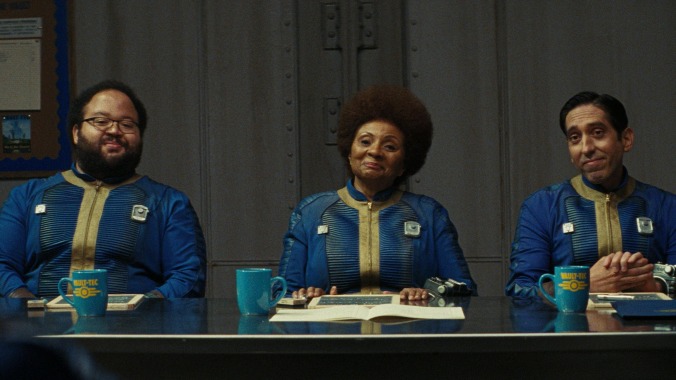There’s a great 40 minutes of TV to be found in the opening episode of Amazon’s new Fallout show. Unfortunately, this is a 60-minute premiere.
We open, as we must, on “The End” (title card included)—the defining moment of both this TV show, and the nearly 30 years of post-apocalyptic video games that it pulls its core ideas, its soundtrack, its iconography, and, when it’s firing on all cylinders, its subversive, satirical tone directly from. Our window on the nuclear devastation about to sweep the California coast happens to be a birthday party, with a real-life cowboy and everything—one who, for now, goes by the name of Cooper Howard (Walton Goggins, grabbing a few fresh lungfuls of air before spending the rest of this show absolutely buried in prosthetics). From the way the dead-eyed dads lurking on the edges of the festivities mad-dog him and gossip, we can tell Cooper’s a man out of step with the shiny, Formica-heavy world around him; from the way he interacts with his daughter Janey (and the fact that Goggins can turn paternal warmth on with the same ease with which he comfortably slips into a thick cowboy accent), we can tell he’s a pretty good dad.
After our title card, we abruptly jump 216 years forward and several hundred yards down. Our focus, as the next title card helpfully tells us, is the show’s central lead: “Lucy,” played by Yellowjackets’ Ella Purnell (whose gift for straight-faced chipperness is, alongside Goggins’ boundless charisma, one of the show’s greatest weapons in this initial outing). Lucy is a model citizen and a fine contributing member of society—the society in question being Vault 33, one of several underground communities that have been weathering the apocalypse with a mixture of genuine optimism (embodied by Lucy’s dad, Hank, played by an in-his-element Kyle MacLachlan) and blithe, oblivious idiocy (embodied by pretty much everybody else).
Lucy has a problem, though: Despite her numerous SPECIAL skills, she hasn’t been able to attract a long-term romantic partner that she isn’t pretty closely related to—and, as Purnell deadpans in one of the show’s first laugh-out-loud lines, “Messing around with your cousin” might be “all well and good for kids. But it’s not a sustainable long-term sexual practice, y’know?” It’s in these sequences, as Lucy and her fellow lucky idiots welcome a crew from the next vault over in a food-for-husband trade, that Fallout works best as black comedy, its humor rooted not in having its characters make fun of each other, or themselves, but in presenting their absurd worldviews so straightly that it can’t help but get a laugh.
Unfortunately for Lucy, her dad, and literally every other human being they know, though, they don’t pick up on the fairly obvious signs that all might not be well with the visitors from Vault 32. Sure, they say the right things—and Lucy’s new husband Monty is easy enough on the eyes that it elicits a note of jealousy from her already-married best friend. But they’re also covered in tattoos and scars, they eat the wedding feast prepared for them like wild animals, and they keep sending shifty glances at each other over dessert. (Also, they’re led by Sarita Choudhury, and you don’t cast her in a part like this unless serious shit is going down.) Serious shit goes down, then, very shortly after Lucy and her new hubby consummate their marriage in an enthusiastic bid to “repopulate America,” as sudden screaming, shouting, and a well-deployed Geiger counter reveal that the “neighbors” (including Monty) are actually murderous, psychotic raiders—and that Fallout the TV series is just as willing to get as enthusiastically, creatively gory as Fallout the games.
Directed by series producer Jonathan Nolan, this horror-movie-esque sequence deliberately recreates the devastation from the show’s opening moments in miniature, a burning film projector standing in for the blazing skies as a thin veneer of civilization abruptly collapses into gory violence. The parallels between the two stories extend even deeper, though: the blue-yellow hues of Goggins’ cowboy costume reappearing as the iconic color scheme of the Vault Dwellers’ suits; the way Lucy unknowingly recreates the thumbs-up gesture Cooper taught his little girl; the fiercely protective relationship between a father and a daughter, which comes into sharp relief as Lucy’s dad reveals he’s not quite the affable doofus he initially presents as. (MacLachlan sums up a bit of that Dale Cooper steel as he calmly drowns one of Lucy’s attackers before sacrificing himself to Choudhury’s mysterious agenda.) Nolan, and writers Geneva Robertson-Dworet and Graham Wagner, rhyme the two segments so well, in fact, drawing such pointed parallels between the big ending of the world and the much more personal one Lucy ends up suffering, that it ends up being to the detriment of the rest of the episode.
Which means it’s time to address the single most baffling element of Fallout’s premiere outing: the decision to shove what are essentially two other mini-episodes, complete with separate title cards, under its bulging skin. It’s not that there’s anything explicitly wrong with “Maximus,” centered on religious/military fascist types the Brotherhood Of Steel, or “The Ghoul,” which reveals that Cooper Howard has survived two long centuries of apocalypse so that he might mete out snarky justice to a bunch of Coen brothers movie rejects. But both are so tonally distinct from “The End” and “Lucy” that it throws a wrench into their building elegance—especially “Maximus,” the first half of which directly interrupts Lucy’s story for something far grimmer and with none of the previous humor. (Notably, the mostly outdoor sequence appears before the big moment when Lucy first steps out of the Vault to find her kidnapped dad, completely undercutting the awe of the moment by showing the Wasteland well in advance of what should have been a big reveal.)
As to the content, “Maximus” is the meatier of the two, largely thanks to an intriguing performance by Aaron Moten as the title character, a low-ranking and unpopular outcast amongst the Brotherhood’s recruits. Subjected to hazing, endless disappointment, and constant abuse, Maximus eventually finds himself dragged in front of one of the Brotherhood’s elders to answer for allegations that he brutally booby-trapped the boot of his best friend/rival Dane (Xelia Mendes-Jones) as retaliation for them being chosen for promotion over him. (In the sequence’s best touch, we never get a straight answer on the matter—although Moten plays the moment with so much flop-sweat nervousness that we’re inclined to believe in his guilt.) One quick ritualized branding later and he finds himself promoted in her place, alongside a silent, metal-armored Knight who’s part of an effort to hunt down a rogue member of something called the Enclave. (There’s more on that in stray observations, for all you fans of the games.)
That particular plot hook is also the driving force motivating the crew of yokels who end up digging up the Ghoul, unaware that any man so nasty that he’s usually kept six feet underground for safety might not be the best of partners for one last bounty hunt. Goggins, now equipped with both Freddy Kreuger’s facial features and his taste for wisecracking comeuppance, quickly dispatches the trio of dummies, before venturing off into the wastes to collect the bounty for himself. And, again, there’s nothing wrong with this sequence, just as there’s nothing all that wrong with “Maximus” (although the latter is shot with such deliberate drabness that the eye does just kind of slide directly off of it). But Fallout’s premiere frequently feels like it’s so excited to tell you three stories that it can’t give proper shrift to even one, and the way the other narratives keep barging in to pull focus from Lucy’s introduction ends up serving as a needless distraction from the episode’s best material. If these three chapters felt of a piece, or like they were meant to comment on each other—or even, honestly, like they came from the same TV show, period—the interpolation could have made for something special. As is, Fallout opens with one really strong episode with a couple of weaker ones jury-rigged to its frame. It’s not the end of the world or anything—but a bummer, nevertheless.
Stray observations
- Welcome to our recaps of Fallout! Because Prime Video released the whole season in a single batch, we’ll be following our standard binge model procedure by rolling out one recap of the eight-episode first season at a time. Then I will drop dead from exhaustion. Looking forward to it!
- In terms of critical perspective, I’ll note here that I’m mostly interested in asking how Fallout works as a TV series on its own merits rather than as an adaptation of the games. That being said, as someone who’s spent hundreds of hours in the virtual wastes, I’ll be sure to note when something feels relevant to bring up. (Also, while I’m working from screeners, I’m writing each review before watching the next episode, so you can consider each of these individual entries spoiler-free for anything that comes after.)
- Speaking of the games, here’s a bit of background for newcomers to the franchise: The original Fallout (subtitled A Post Nuclear Role Playing Game) was published by Interplay in 1997, telling a relatively straightforward story about a Vault Dweller wandering the Wasteland, trying to find a new water source for his people. After a few sequels and spin-offs (one fantastic, one so-so, and one abominable), the series went moribund for several years, until Bethesda Softworks (a.k.a., “the Skyrim people”) revived it with 2008's massively successful Fallout 3. So far, the TV series isn’t taking direct inspiration from any of the games, although 3 is the most obvious reference point—with the relationship between Lucy and Hank mapping pretty easily to the child-father relationship from that game.
- Between this and Severance, Zach Cherry has the market cornered on “guy extremely acclimated to his oddball, insular society,” huh?
- Yes, that’s Matt Berry as the voice of the Mr. Handy robot in the introduction; here’s to getting more of him as the series progresses.
- Marking down every reference to Fallout canon in this episode is probably an exercise in futility, but some of the easy ones include the Grognak The Barbarian cartoon the kids are watching before the bombs fall, the ubiquitous Pip-Boys on all the Vault Dwellers’ arms, and a few glimpses of recurring products like Sugar Bombs and, of course, Nuka-Cola. (Oh, and the idiots who wake up the Ghoul are using the Junk Jet gun from Fallout 4 to fire a plastic baby doll’s leg through some poor sap’s chest.)
- I’m halfway certain “Maximus” is in here just to get some shots of the series’ famed Power Armor and Vertibirds into the first episode. The Armor looks genuinely cool—convincingly clunky and intimidating. The series aesthetics are pretty great overall, really.
- Choudhury’s raider leader is credited as “Lee Moldaver,” a name she shares in the real world with a moderately prominent California community activist who died in 2021. Whether that’s a joke, a reference, or just a very weird coincidence, given the California setting of the series, remains to be seen.
- Okay, game nerds: I guess it was inevitable that the Fallout show would dip into the Enclave stuff, but it’s still depressing to see the franchise’s dullest villain crop up quite so soon. (Yes, the Enclave makes sense as a representative of the new world being choked by the grasping tendrils of the past; no, it’s not especially interesting.)
- On the plus side, that renegade Enclave scientist is absolutely traveling with Dogmeat, per the Brotherhood images, so good puppy times should be here soon.
- The closing credits are suitably creepy, set to Sheldon Allman’s novelty song “Crawl Out Through The Fallout,” which appeared in the soundtrack of Fallout 4.









































